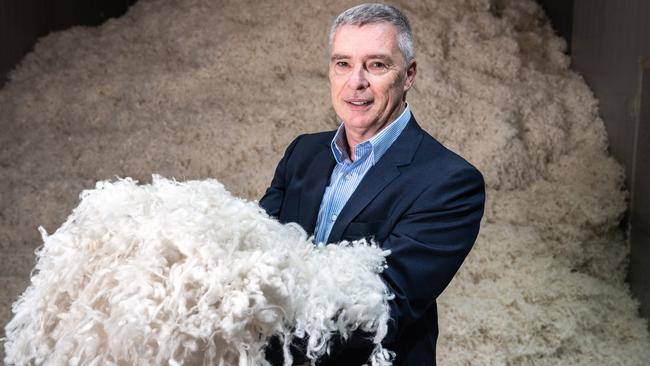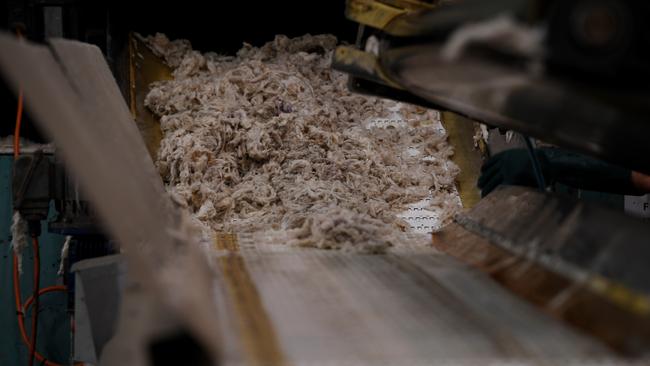Michell Wool backs push to bring back local manufacturing
The country’s oldest and largest wool processor is backing a new push to bring manufacturing back to Australia.

Business
Don't miss out on the headlines from Business. Followed categories will be added to My News.
The country’s oldest and largest wool processor is backing a new push to bring manufacturing back to Australia following decades of reliance on a dominant Chinese market.
WoolProducers Australia will oversee a new study to investigate the feasibility of expanding Australia’s early-stage processing after securing a $662,000 grant from the federal government’s Agricultural Trade and Market Access Cooperation program.
The review will also assess opportunities to further develop and diversify processing capacity in overseas locations.
About 90 per cent of Australia’s annual wool clip is currently sent to China for further processing.
Early-stage processing refers to the steps in preparing raw wool for spinning, and involves scouring or washing the wool, and then combing or carbonising the material to remove any remaining impurities.
The Michell family has been processing wool since 1870, and is one of just three remaining early stage processors in Australia.
David Michell, executive director of Michell Wool, said it was the right time to consider bringing back local manufacturing.
“I think the growers are going well we’re very much exposed when 90 per cent of what we grow goes to one marketplace - that is potentially a risk so is there a way to bring some home?” he said.

“I think we can actually make it economic and bring it back home again. I would certainly encourage it - it would be nice to see a larger industry back in Australia if it’s viable.
“If we can’t bring it home can we diversify anyway and give the farmers more comfort that there is actually more demand on a broader base - it makes business sense to me.”
Mr Michell said that in the early 1990s there were 26 early-stage processors in Australia, but the rise of Chinese manufacturing meant there were only three left - his family’s business, Victoria Wool Processors in Melbourne’s south-west and E.P. Robinson in Geelong.
There are several proposals to develop new early stage processing plants in Australia, including at Blackall in Queensland and Kangaroo Island in South Australia.
Mr Michell said his company processed about 20 million kilos of wool each year at its Salisbury plant in Adelaide’s north, and pending the outcome of the study, was prepared to ramp up its existing scouring and carbonising activities while also re-establishing a domestic combing operation.
“Holding on for the last 20 years has been a challenge - it’s meant every time you do something you’ve got to try to do it smarter than the next guy, and I think our productivity has improved significantly in the last 20 years which is why we’re still competitive,” he said.
“I reckon I could mount a case to get investors in who would want to join me in expanding what we currently do.
“There aren’t too many of us around these days, with the knowledge of scouring, carbonising and top making, but I think I’ve got something to bring to the table.
“I’m already in business, it would be very quick to add to what I’ve got, so in terms of trial plants and trying things out we can do it tomorrow at Salisbury.”
In terms of expanding and diversifying the overseas customer base, Mr Michell said Southeast Asia, India, Turkey, Italy, Eastern Europe and the US were the likely growth regions.
Despite the industry’s reliance on Chinese wool manufacturers, Mr Michell said there was little risk of being embroiled in the geopolitical trade tensions which have seen tariffs slapped on Australian exports including wine, barley and beef.
“If you’re making wool apparel you’ve got to come to Australia because 80 per cent of the world’s apparel wool comes from Australia,” he said.
“If you look at the other commodities that have been subject to tariff issues around the world, generally there are options for supply in other countries - I don’t think it’s a big issue for us.”
Mr Michell said the study came at a challenging time for the industry as it recovers from the devastating impact of Covid-19.
“Covid has been pretty horrible really because we sell into the apparel sector predominantly, and when retail slams its door shut, and retail turnover drops by 80 per cent, that means we drop by 80 per cent as well,” he said.
“I have my fingers crossed that the retail trade in the northern hemisphere will kick back into gear and that’s getting us back onto a normal footing here.”
Agriculture Minister David Littleproud said the potential expansion of early-stage processing in Australia would deliver investment and jobs in regional areas.
“If there’s one thing the global pandemic has taught us, it’s that market diversification is important for healthy industries,” he said.
“By looking for alternative markets for our wool, we can make sure we aren’t falling into the trap of putting all our eggs in the one basket.”
More Coverage
Originally published as Michell Wool backs push to bring back local manufacturing




